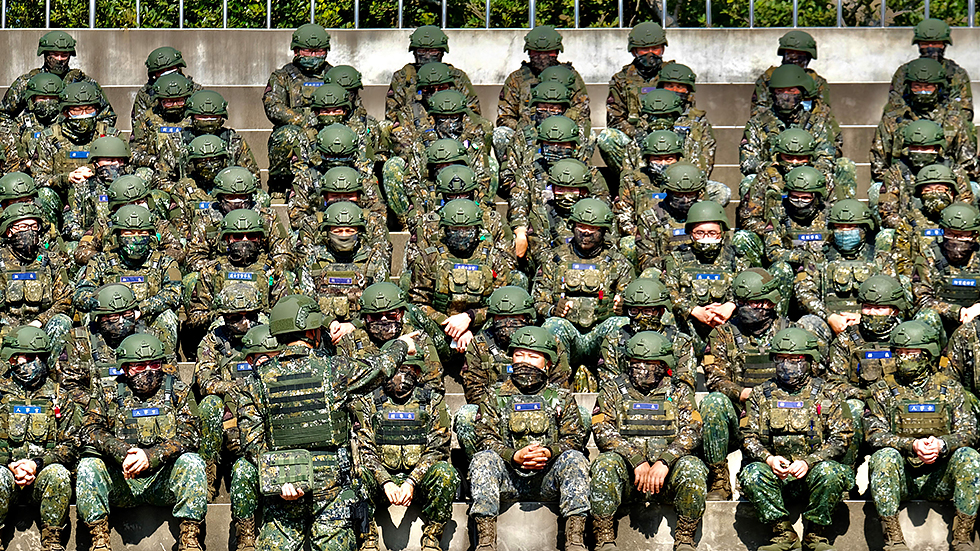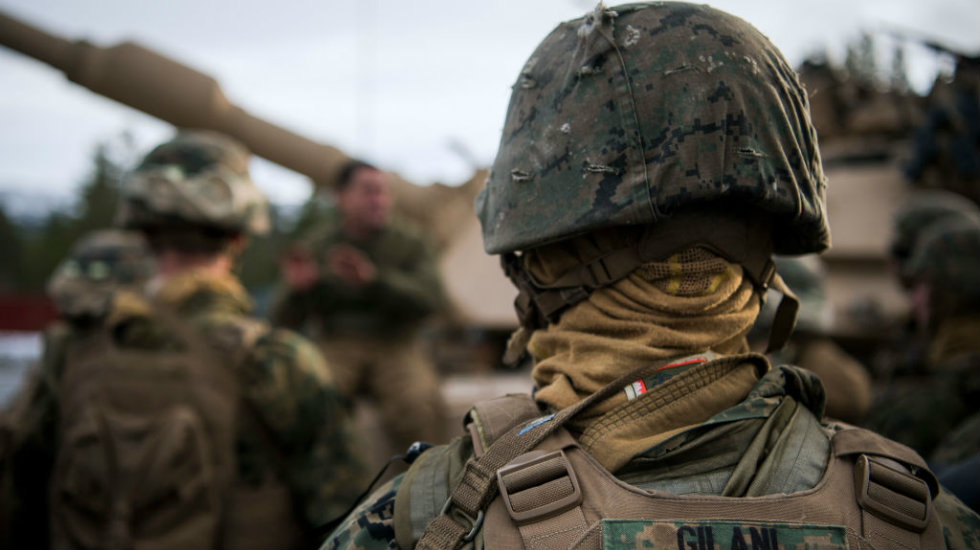Defense & National Security — Troops secretly train with Taiwan as tensions with China continue
Troops secretly train with Taiwan as tensions with China continue: report

It’s Thursday, welcome to Overnight Defense & National Security, your nightly guide to the latest developments at the Pentagon, on Capitol Hill and beyond. Subscribe here: digital-staging.thehill.com/newsletter-signup.
Tensions between the United States and China ratcheted up with reports of a CIA center focused on Beijing and the news that U.S. troops have been secretly training Taiwan’s military forces.
We’ll detail how Washington is aiding Taipei, U.S. efforts to deter Beijing stateside and China’s response.
For The Hill, I’m Ellen Mitchell. Write to me with tips: emitchell@digital-staging.thehill.com.
Let’s get to it.
US troops secretly train Taiwan forces for past year: WSJ

U.S. forces have been secretly training Taiwan’s military forces in the country for at least a year amid concerns of Chinese aggression toward the self-ruled island, The Wall Street Journal reported Thursday.
Roughly two dozen members of U.S. special operations and support troops are training small units of Taiwanese ground forces, while a contingent of the U.S. Marines is helping local maritime forces with small-boat training, U.S. officials told the Journal.
Context: The report comes as China has stepped up its aggressive military activity near Taiwan, flying nearly 150 warplanes near the island in the past week in an attempt to intimidate a country that it has long viewed as part of its territory. Taiwan, for its part, is preparing for possible war against China.
Beijing has also built up its military for years and has threatened to take control of the island by force if necessary, which has concerned U.S. officials.
Warnings of an invasion: A pair of top U.S. admirals warned earlier this year that China could try to invade Taiwan sooner than previously thought.
Adm. Philip Davidson, the former head of U.S. Indo-Pacific Command, told senators in March that China could try to invade Taiwan “in the next six years,” while his successor, Adm. John Aquilino, told senators “this problem is much closer to us than most think.”
And Taiwanese Defense Minister Chiu Kuo-cheng on Wednesday said tensions with China are the worst they have been in 40 years. He predicted that Beijing already has the capability to invade Taiwan and could mount a “full-scale” invasion by 2025.
China’s response: In a statement, China’s Foreign Ministry pressed the United States to stick to prior agreements and to stop its military aid to Taiwan, noting that “China will take all necessary steps to protect its sovereignty and territorial integrity.”
CIA LAUNCHES NEW CENTER FOCUSED ON CHINA
The CIA is launching a new mission center to address threats posed by Beijing, the latest action the Biden administration has taken to direct resources toward countering China.
CIA Director William Burns said in a statement that the new unit, formally dubbed the China Mission Center, will cut across all corners of the agency and “further strengthen our collective work on the most important geopolitical threat we face in the 21st century, an increasingly adversarial Chinese government.”
Burns, who recently informed the CIA workforce of the plans, said that the agency will still focus on other threats, including terrorism and those emanating from Russia, North Korea and Iran.
Other changes: The CIA also said that it is creating a new position of chief technology officer and a Transnational and Technology Mission Center to focus on emerging technologies, economic security, climate change and global health. The agency also plans to change its hiring process to reduce the time it takes for applications to join the agency, in a bid to make it more competitive. This includes launching a technology fellows program that will bring experts to the agency for between one and two years.
CIA Deputy Director David Cohen will oversee the changes to the agency’s organizational structure, the statement said.
Upcoming meetings: News of the mission center comes as U.S. officials are tentatively planning for Biden and Chinese President Xi Jinping to meet virtually before the end of the year. National security adviser Jake Sullivan and China’s top diplomat, Yang Jiechi, reached an agreement in principle for Biden and Xi to hold a virtual bilateral meeting after a lengthy discussion in Switzerland on Wednesday, a senior administration official said.
LAWMAKERS CALL FOR END TO ‘STRATEGIC AMBIGUITY’ WITH TAIWAN
Two congressional lawmakers on Thursday told Politico that they support moving away from “strategic ambiguity” toward Taiwan, sending a message to China that the U.S. will respond to aggression towards the democratically-governed island.
“I think that removing the ambiguity would be good,” Sen. Thom Tillis (R-N.C.), who sits on the Senate Armed Services Committee, told Politico during its first Defense Forum.
“It would probably have a calming effect on China’s aspirations,” Tillis added. “I think it’s also important for the American people to understand how devastating China’s invasion of Taiwan would be.”
Rep. Ami Bera (D-Calif.), who sits on the House Committee on Foreign Affairs, similarly signaled his support for moving away from the U.S. government’s long-standing policy of deliberate ambiguity toward Taiwan.
“I use the term ‘strategic deterrence,’ but deterrence only if there’s clarity in that deterrence,” said Bera.
Pentagon climate plan prepares military for extremes

The Pentagon on Thursday began its biggest effort ever to prepare the military for the effects of climate change with the release of a 32-page strategy.
“Climate change is an existential threat to our nation’s security, and the Department of Defense must act swiftly and boldly to take on this challenge and prepare for damage that cannot be avoided,” Defense Secretary Lloyd Austin said in a statement released alongside the strategy, known as the Climate Adaptation Plan.
What’s the aim?: The Pentagon’s strategy aims to transition the military into an agency that can handle and operate within ever increasing hurricanes, wildfires, heat, drought and floods “that can trigger crises and instability around the world.”
Plan details: The new plan will help the Pentagon better consider what effects climate change will have on its operations, training, installations, planning and business processes when making decisions.
This is crucial, Austin said, as the effects of climate change are already costing the Pentagon billions of dollars and will “continue to amplify operational demands on the force, degrade installations and infrastructure, increase health risks to our service members, and could require modifications to existing and planned equipment.”
A combined effort: The Defense Department was one of 23 agencies to release climate-adaptation plans. Others included the departments of Homeland Security, Transportation and the Centers for Disease Control and Prevention.
Read more on the strategy here.
Marines: Burnout, pandemic contributed to accident that killed 9

A new report by the Marine Corps attributed burnout and the coronavirus pandemic to a 2020 accident that killed nine service members off the coast of California.
Lt. Gen. Carl Mundy III said in the report released Wednesday that it would be “a mistake to discount or overlook” the pressures and duties on officers at the time the 26-ton amphibious assault vehicle sank near San Clemente Island.
“The claims on their time and attention surfaced in a number of interviews with several senior officers who described the conditions during this period as second only to their experience in combat,” Mundy said.
What happened?: The accident occurred on July 30, 2020, just months after the beginning of the coronavirus pandemic when the U.S. was struggling with rising cases and no vaccine.
An officer interviewed during the investigation said training last year was “not in a normal place.”
Contributing factors: The 15th Marine Expeditionary Unit had “compressed and complicated available training opportunities” due to a coronavirus outbreak that occurred on the USS Theodore Roosevelt earlier in the year, Mundy said.
The “major challenges to his command on and before July 30, 2020 were a combination of materiel readiness, compressed training timelines, and adjustments to the predeployment training program schedule,” the report said.
Who is to blame?: The Navy’s investigator for the report, Rear Adm. Christopher Sweeney, said commanding officer Capt. Dave Kurtz “did not fully understand communication pathways” between the ship and Marine vehicles the day the accident occurred but that the misunderstanding was not responsible for the fatal incident.
Several people have faced administrative action in connection with the accident, Vice Adm. Roy Kitchener told reporters, with no Navy personnel removed from their job, The Washington Post reported on Wednesday. Several Marines were relieved of their duties following the incident.
WHAT WE’RE READING
- Majority supports American troop intervention if allies targeted: poll
- U.S. wants nuclear talks with Iran in Vienna to restart ‘soon’
- US nuclear sub hit object in South China Sea
- Afghan man suing US, wants to reunite with sons
- Blinken, new Japanese counterpart share concerns on North Korea
- Microsoft report finds Russia dominant force behind cyberattacks in past year
- Federal office to probe allegations Ghani left Afghanistan with millions
- Senate Democrat says hundreds of Americans, Afghan allies arrived in Qatar after being stranded in Afghan airport
That’s it for today. Check out The Hill’s defense and national security pages for the latest coverage. See you Friday.
Copyright 2024 Nexstar Media Inc. All rights reserved. This material may not be published, broadcast, rewritten, or redistributed..













